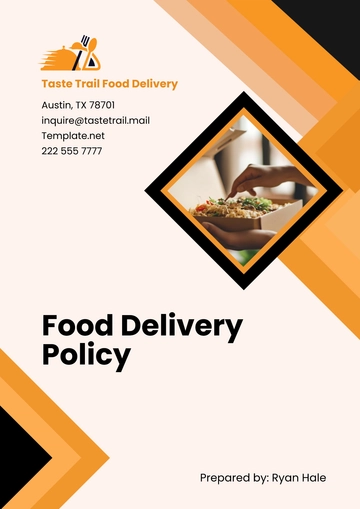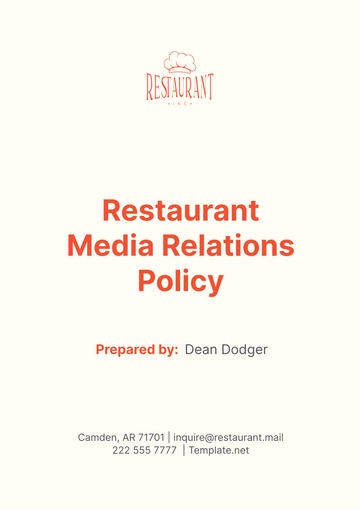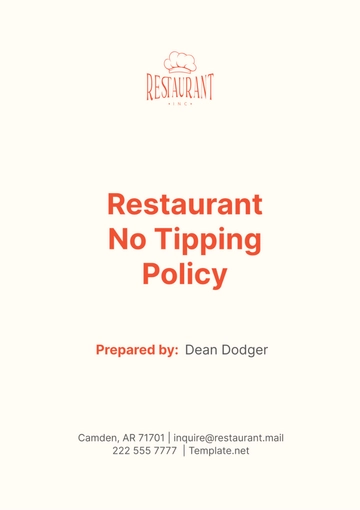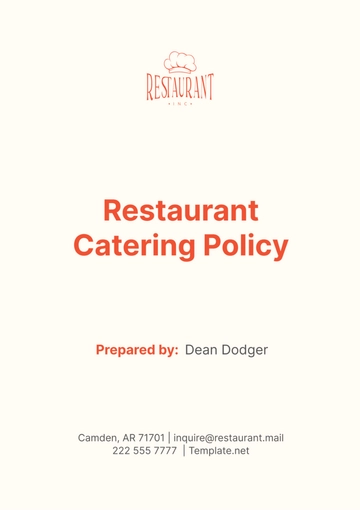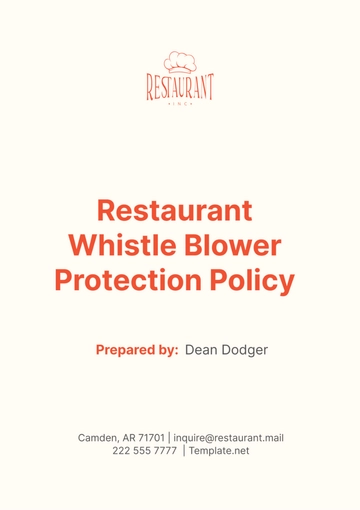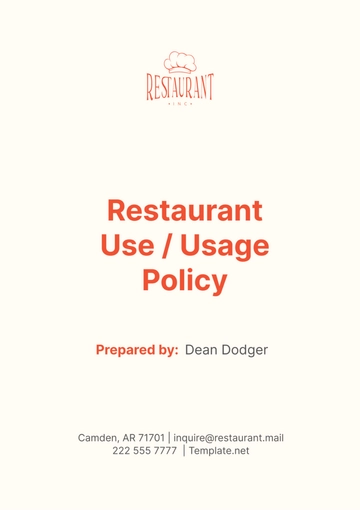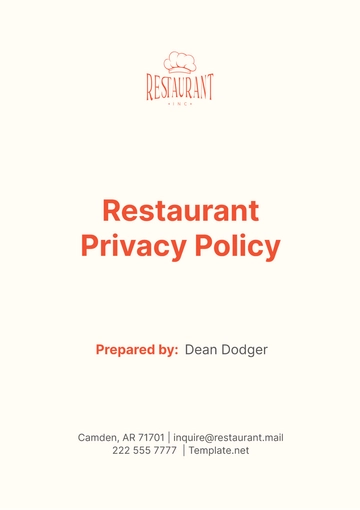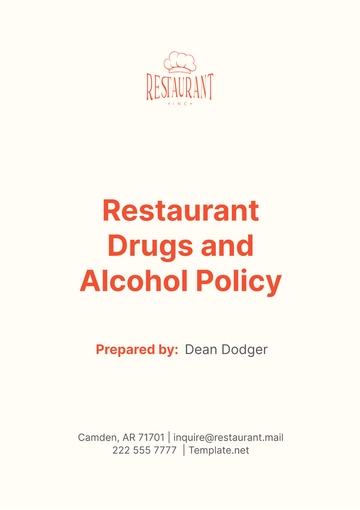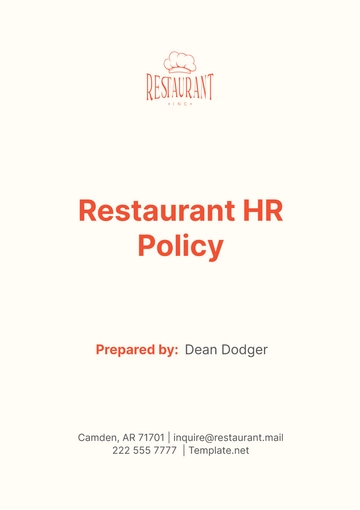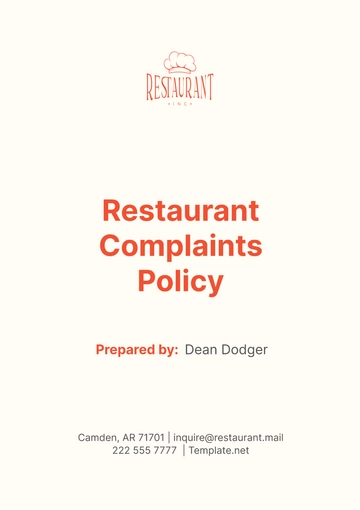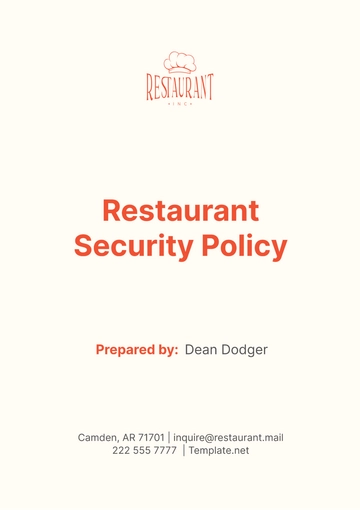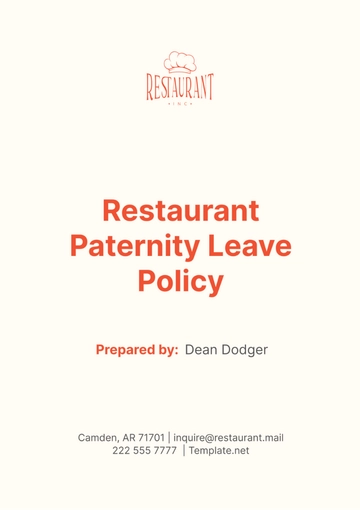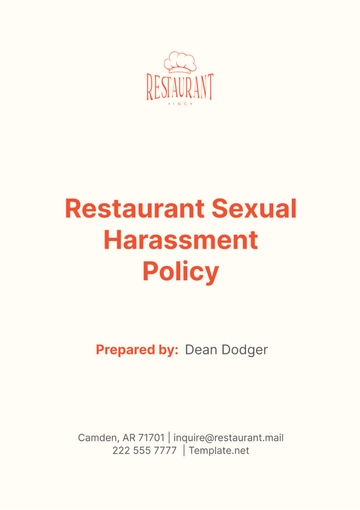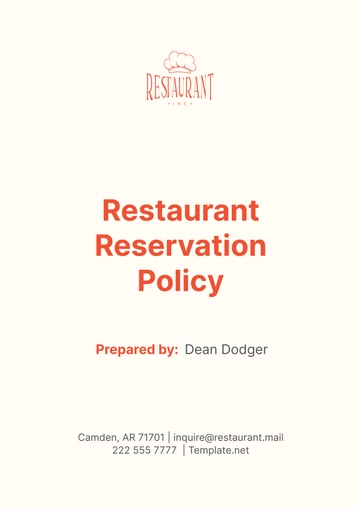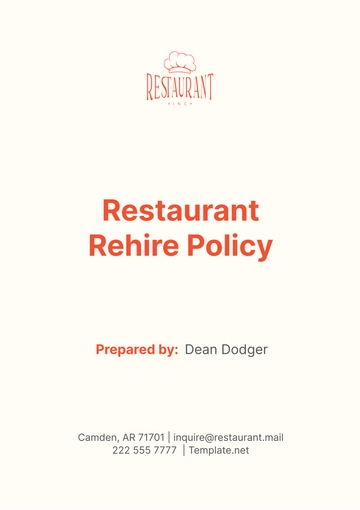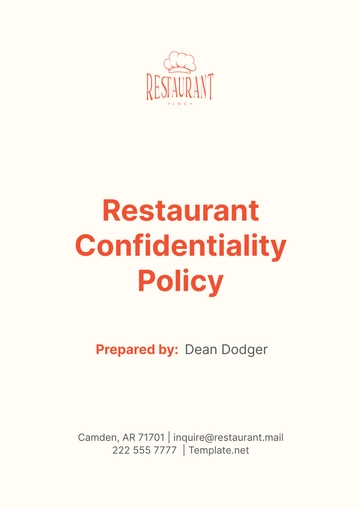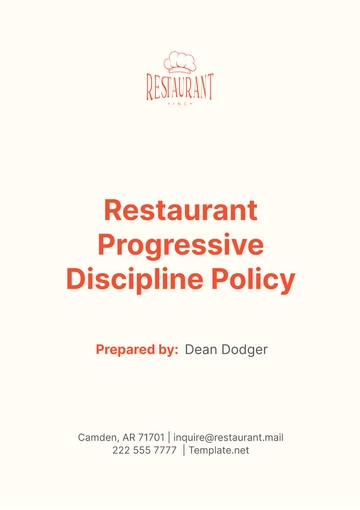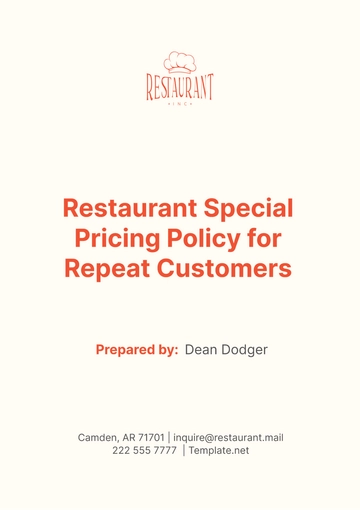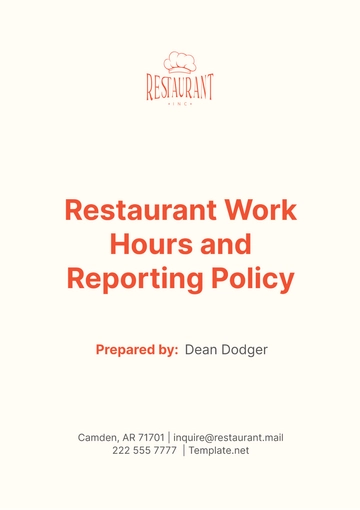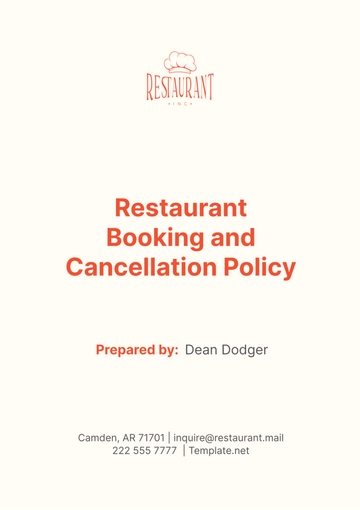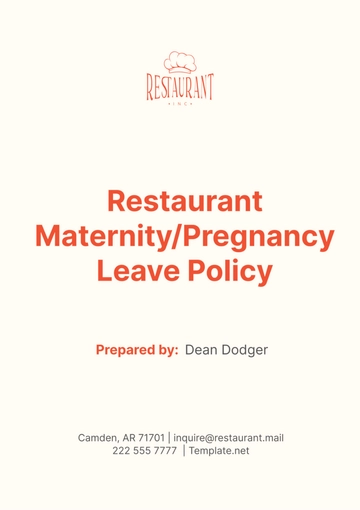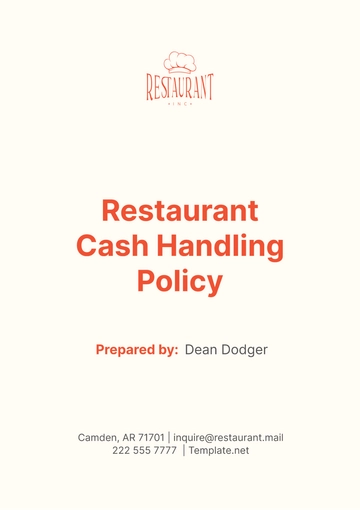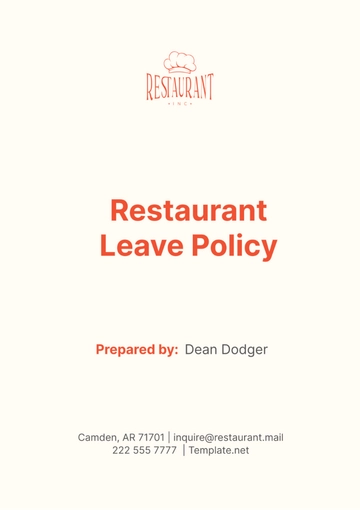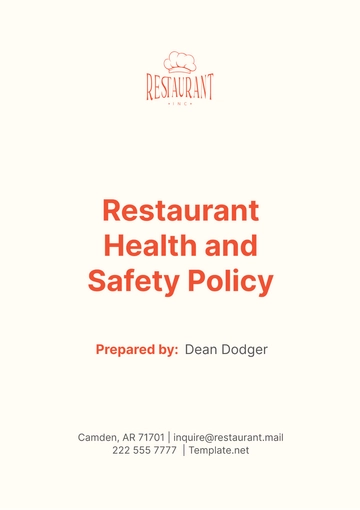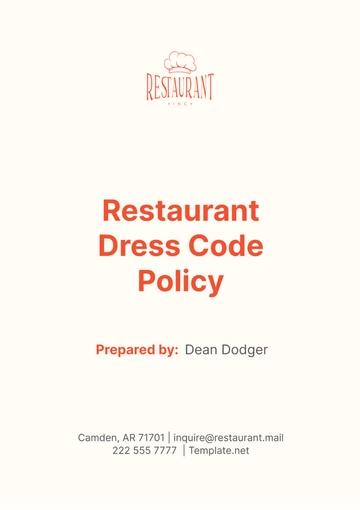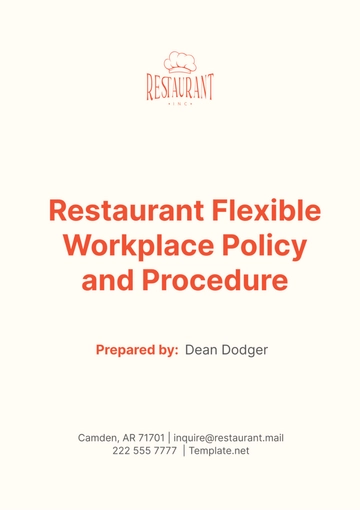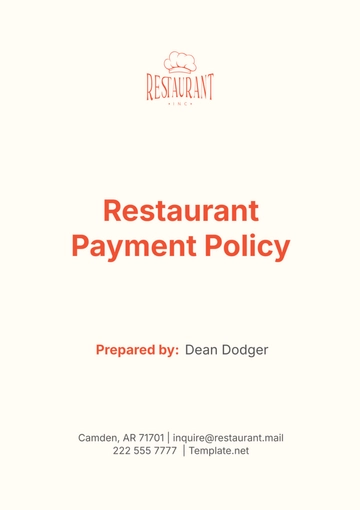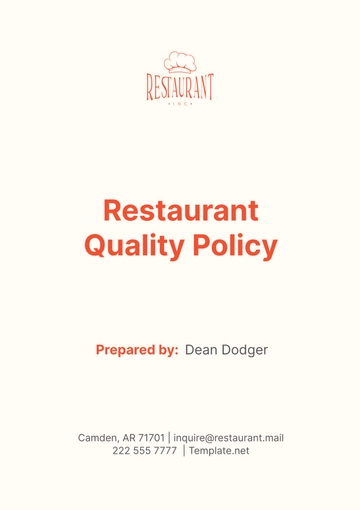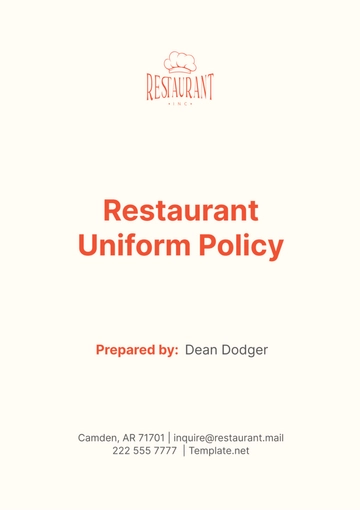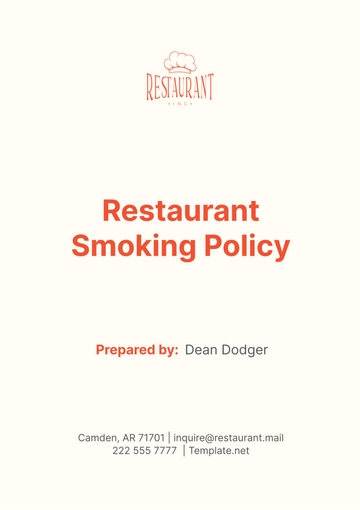Free Restaurant Catering Policy
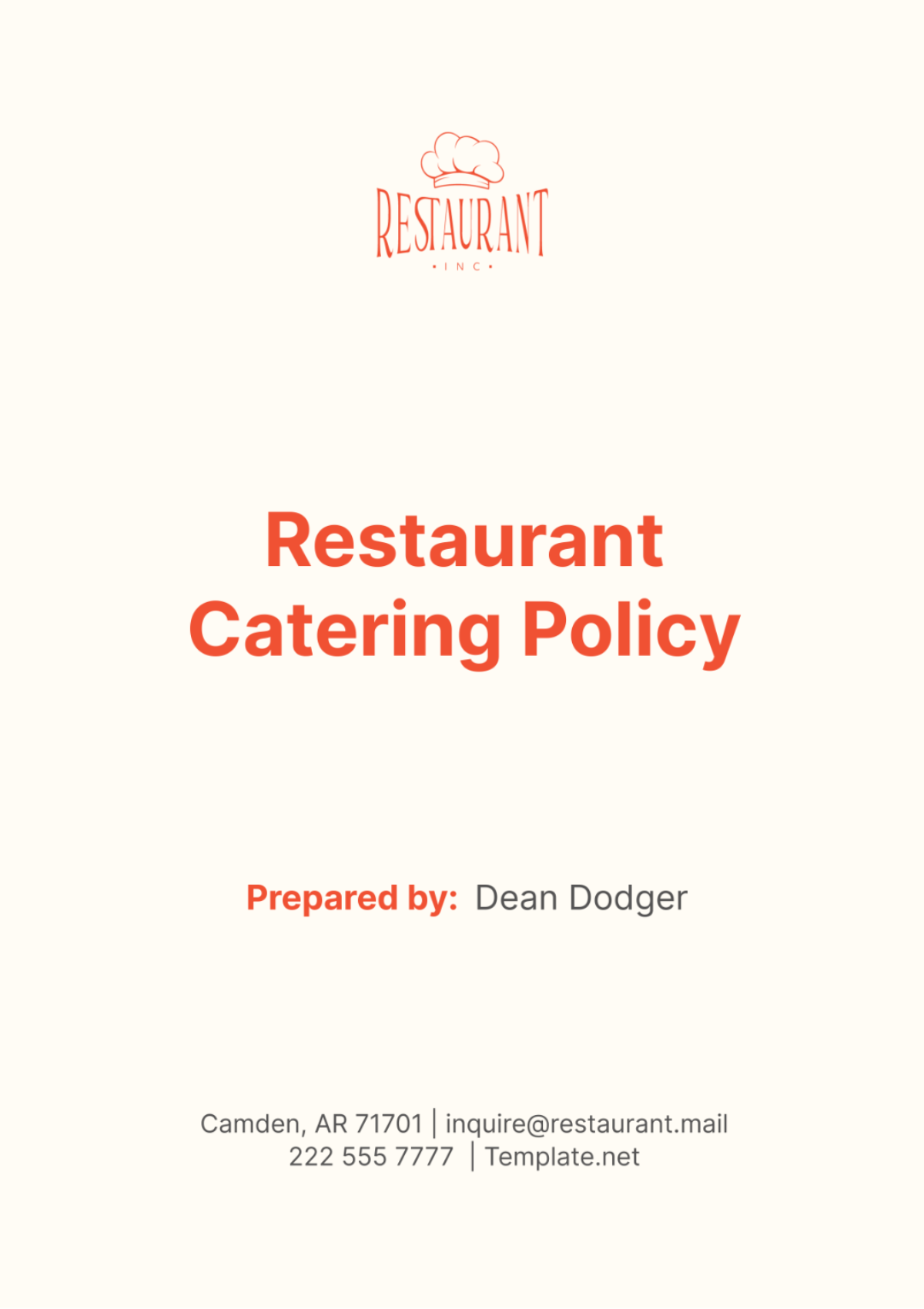
Effective Date: [Month Day, Year]
Last Reviewed: [Month Day, Year]
1. Purpose
The purpose of the Restaurant Catering Policy is to outline the standards and procedures for providing catering services both within and outside the restaurant premises, ensuring consistency and high-quality service delivery. This policy applies to all catering operations conducted by the restaurant.
2. Scope
The Restaurant Catering Policy of [Your Company Name] establishes guidelines that are critical to maintaining the quality and integrity of our catering services. This policy applies universally to all aspects of our catering operations, ensuring that each function is executed with the highest level of professionalism and efficiency. The areas covered under this policy include:
a. Staff Responsibilities: Outlines the duties and expectations for all team members involved in catering operations.
b. Food Safety: Ensures that all food handling and preparation meet stringent health and safety standards.
c. Customer Engagement: Focuses on building strong relationships with clients through professional interaction and responsive service.
d. Logistical Planning: Involves the strategic coordination of resources and schedules to deliver seamless catering services.
e. Presentation: Emphasizes the importance of visually appealing setups that align with client expectations and enhance the overall dining experience.
f. Punctuality: Stresses the necessity of adhering to agreed timelines to ensure service reliability and client satisfaction.
g. Professionalism: Maintains that all interactions, whether internal or with clients, are conducted with the utmost professionalism and courtesy.
3. Staff Responsibilities
For [Your Company Name], the professionalism and readiness of our catering staff are key to the success of our services. To uphold our high standards, all staff involved in catering operations are required to:
a. Adherence to Policies: Understand and follow the Restaurant Catering Policy comprehensively, ensuring all guidelines are met during each event.
b. Professionalism and Courtesy: Maintain a high level of professionalism and courtesy at all times, representing our brand with integrity.
c. Timeliness: Ensure punctuality and timely service delivery to uphold our commitment to client satisfaction.
d. Continuous Training: Participate in ongoing training programs designed to enhance skills and knowledge in catering practices, customer service, and safety protocols.
4. Food Safety
Food safety is of utmost importance in our catering operations. To safeguard the health of our clients and maintain the highest standards of quality, our staff must:
a. Handling and Storage: Follow proper food handling and storage procedures to prevent foodborne illnesses and contamination.
b. Compliance with Standards: Ensure that all dishes are prepared in compliance with local health and safety regulations.
c. Ingredient Surveillance: Regularly check ingredients for freshness and expiration, and dispose of items that do not meet quality standards in an appropriate manner.
5. Customer Engagement
Enhancing customer satisfaction is a cornerstone of our catering services. To achieve this, our staff are trained to:
a. Professional Interactions: Engage with customers in a professional and courteous manner, ensuring all communications are clear and polite.
b. Feedback Integration: Actively seek customer feedback during and after events to gauge satisfaction and address any concerns promptly.
c. Informative Services: Provide customers with clear, precise information about our catering services, including menu options, customization opportunities, and pricing, to ensure transparency and build trust.
6. Logistical Planning
Effective logistical planning is a cornerstone of successful catering services, ensuring that every aspect of an event is seamlessly coordinated. Staff members at [Your Company Name] are expected to meticulously adhere to the following guidelines:
a. Advance Planning: Plan all logistics for catering events well in advance to ensure every detail is considered from setup to conclusion. This includes timelines, guest counts, and layout arrangements.
b. Supplier Coordination: Maintain constant communication with suppliers and vendors to ensure the timely delivery of supplies and equipment. This coordination should include confirmation of order details and delivery schedules.
c. Contingency Measures: Develop comprehensive backup plans for each event to address potential unforeseen issues such as inclement weather, supply delays, or last-minute changes in client requirements. This readiness ensures flexibility and adaptability under varying circumstances.
7. Presentation
The visual presentation of our catering services is not only a reflection of our brand's identity but also an integral part of the dining experience. To uphold the highest standards, our staff must:
a. Maintenance of Materials: Ensure that all presentation materials, including linens, silverware, and serving dishes, are impeccably clean and well-maintained. Regular checks and maintenance should be part of the pre-event preparation.
b. Aesthetic Setup: Set up catering displays in a visually appealing manner that enhances the food's appeal and aligns with the event's theme. Attention to detail in layout and decor can significantly impact guest impressions.
c. Branding Consistency: Adhere to the branding guidelines in all forms of presentation to consistently convey the restaurant's image and values. This includes the use of logos, colors, and thematic elements that resonate with the brand.
8. Punctuality
Punctuality forms the backbone of trust and reliability in catering services, influencing client satisfaction and the overall success of events. To ensure the timely execution of responsibilities, all staff involved in catering must:
a. Early Arrival: Arrive at the venue well before the scheduled start time to accommodate ample setup time and address any last-minute adjustments.
b. Preparation of Equipment and Food: Ensure that all equipment and food items are set up and ready to serve according to the event schedule. This includes the arrangement of dining areas, food stations, and beverage counters.
c. Strict Adherence to Timeline: Follow the event timeline strictly, from the beginning of service to the end, ensuring that all activities are executed on time, such as the serving of courses and the management of event flow.
9. Professionalism
Professionalism is vital in maintaining and enhancing the reputation of [Your Company Name]. Our staff are held to the highest standards of conduct, which include:
a. Dress Code Compliance: Dress appropriately in accordance with the restaurant's dress code. Uniforms should be neat, clean, and reflective of the professionalism expected at all our events.
b. Effective Communication: Communicate effectively and respectfully with clients and colleagues. This includes clear, polite communication styles and the ability to listen actively and respond appropriately.
c. Handling of Situations: Manage all situations, including emergencies, with a calm and professional demeanor. Staff should be trained to handle unexpected challenges smoothly and efficiently, ensuring minimal disruption to the event.
10. Client Consultation and Customization
Client consultation and customization are key elements in providing a personalized catering experience that meets and exceeds client expectations. [Your Company Name] emphasizes the importance of detailed planning sessions with clients to ensure their specific needs are addressed. Key aspects include:
a. Detailed Consultations: Conduct comprehensive consultations with clients to discuss their event objectives, preferences, dietary restrictions, and thematic requirements. This ensures that the catering services are tailored to the individual needs of the event.
b. Customized Menus: Offer the flexibility to customize menus according to the client's taste and dietary needs. This may involve creating unique dishes, adjusting recipes to accommodate allergies, or incorporating themed elements to align with the event.
c. Feedback Integration: Use feedback received during consultations to refine and perfect the service offerings, ensuring that each client’s vision is accurately realized.
11. Equipment and Facility Management
Proper management of catering equipment and facilities is essential to ensure operational efficiency and safety during events. [Your Company Name] has established protocols to manage these resources effectively:
a. Equipment Maintenance: Regularly inspect and maintain catering equipment to ensure it is in optimal working condition. This includes cleaning, servicing, and repairing tools and machinery used in catering services.
b. Facility Readiness: Ensure that the facilities used for catering, whether onsite or offsite, meet all health and safety standards. This includes proper sanitation, adequate space for food preparation, and safe electrical setups.
c. Logistics Coordination: Efficiently manage the logistics of transporting equipment and setting up facilities to ensure that events proceed smoothly without any logistical hitches.
12. Continuous Improvement and Quality Control
To maintain the highest standards of catering service, [Your Company Name] is committed to continuous improvement and rigorous quality control. This involves several strategic actions:
a. Regular Quality Assessments: Conduct regular assessments of catering services to identify areas for improvement. This includes reviewing client feedback, monitoring service delivery metrics, and assessing the quality of food and presentation.
b. Staff Training: Invest in ongoing training for catering staff to keep them updated on the latest culinary techniques, customer service best practices, and safety protocols. This ensures that all team members are equipped to deliver exceptional service.
c. Innovation in Services: Encourage innovation in catering services by experimenting with new recipes, presentation styles, and event themes. This not only enhances the client experience but also keeps the company competitive in a dynamic market.
d. Feedback Loops: Establish effective feedback loops that allow staff and clients to provide input on the catering experience. This feedback is crucial for making informed adjustments and continuously enhancing service quality.
The implementation of this Restaurant Catering Policy is intended to streamline catering operations and provide clear guidelines to staff, thereby maximizing customer satisfaction and operational efficiency.
For any questions or further clarifications, please contact us at [Your Company Email] or call [Your Company Number].
- 100% Customizable, free editor
- Access 1 Million+ Templates, photo’s & graphics
- Download or share as a template
- Click and replace photos, graphics, text, backgrounds
- Resize, crop, AI write & more
- Access advanced editor
Unlock seamless catering operations with our Restaurant Catering Policy Template from Template.net. Fully customizable and editable, this template ensures your policies are clear and professional. Editable in our AI Editor Tool, it offers flexibility and precision. Elevate your business standards, save time, and focus on what you do best—delivering exceptional dining experiences.
You may also like
- HR Policy
- Restaurant Policy
- Company Policy
- Accounting Policies and Procedures
- Website Policy
- Privacy Policy
- Safety Policy
- School Policy
- IT and Software Policy
- Law Firm Policy
- Construction Policy
- Interior Design Policy
- Travel Agency Policy
- Education Academic Policy
- Security Policy
- Real Estate Policy
- Expense Policy
- Software Policy
